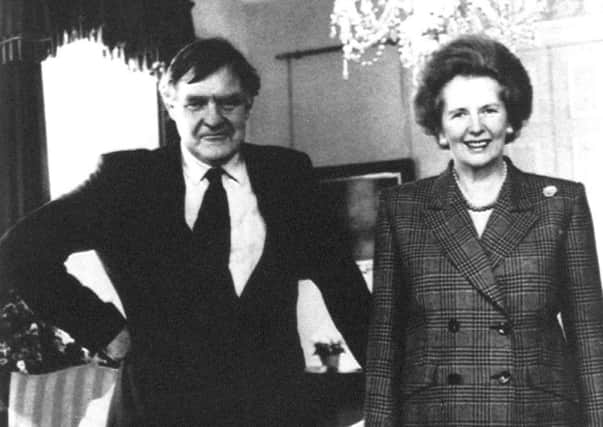My life with Margaret Thatcher 40 years on and what it was like to work for the Iron Lady – Bernard Ingham


While I had worked successfully for Tory ministers Robert Carr, Maurice Macmillan and Lord Carrington. in between Labour’s Barbara Castle and Tony Benn, I never expected to be sent to No 10 to work for her.
Advertisement
Hide AdAdvertisement
Hide AdAfter all, in 1965 I unsuccessfully fought an election in Leeds’s Moortown Ward for Labour and the Tories well knew I wrote a somewhat forthright column for Labour’s Leeds Weekly Citizen in the early 1960s.
In any case I had never met Mrs Thatcher, except for all of 15 seconds when she visited the Department of Energy within a month of taking office presciently to find out how to live with Arthur Scargill. They couldn’t tell her and she was not best pleased.
So why did she choose me? She didn’t. She came to office without a Press Secretary. The media was not her natural habitat and the system rapidly concluded that if anybody needed a manager of her media relations it was her. So they came up with me.
I suppose they thought I had the right background – in industry, unions and the economy – had survived two mercurial Ministers in Mrs Castle and Benn and would probably cope with Mrs Thatcher for as long as necessary. That might not be long because most people in 1979 thought Britain ungovernable.
Advertisement
Hide AdAdvertisement
Hide AdSo, how did I find her on October 1, 1979? Frankly, a problem. She wilfully refused to read newspapers and just dipped into radio and TV, telling us to switch the telly off when she came on. This made her vulnerable in the Commons to the charge of being out of touch. And she was not exactly of this world. Otherwise she would never have said “Every Prime Minister needs a Willie”.
So I persuaded her that, if I summarised the Press for her every morning, she would use it as the basis for her 9am daily briefing. It was one of the best moves I ever made. It informed her and gave us officials a steer on how she was thinking.
I found her talkative, though not as passionately loquacious as Barbara Castle, a hater of yes-men and revelling in knock-down argument. Arguing with her when she visited that male enclave, the Whips’ office, put John Major on his climb up the greasy pole.
Without much sense of humour, she was probably the most tactless woman I have ever met, which is saying something since I was brought up in Yorkshire. She told Mikhail Gorbachev at their first meeting in 1984 that she hated Communism but that the Russians were entitled to have it secure within their own borders.
Advertisement
Hide AdAdvertisement
Hide AdHer almost uniquely combative way of conducting diplomacy brought out the best in an equally-argumentative Gorbachev and revealed Ronald Reagan as a generous and noble soul.
As a workaholic, she put in about 20 hours a day, Monday to Friday, and sometimes fell asleep around 2am reading my notes to her. Her initials, MT, to confirm she had read and digested them, sometimes dozily slid off the page.
Fortunately, she had the constitution and stamina to cope with this workload, not to mention 500,000 miles of travel in my 11 years with her. She also had real guts as shown by her perseverance with unpopular, stringent economic policies for seven years until things improved to provide more resources for public services.
She was prompt – being late was discourteous – decisive, well-ordered and kind to people she relied on. When my wife was run over by a runaway lorry in a Croydon street market during the Falklands campaign, she told me she did not expect to see much of me for a bit.
Advertisement
Hide AdAdvertisement
Hide AdThis phenomenon raised the standing of Britain in the world after the Falklands campaign as she fought a national loss of self-confidence that now manifests itself in Remainers.
With Reagan and Gorbachev, she brought a (temporary) end to the Cold War. At home, she stopped the unions abusing their power, liberated enterprise and improved our economic performance until, to her mortification, clever-dick Chancellor Nigel Lawson lost control of inflation.
And if the EC had listened to her in Bruges in 1988 about the dangers of ever-closer European union, we would have been spared Brexit.
I’m afraid they don’t make’ em like her any more.